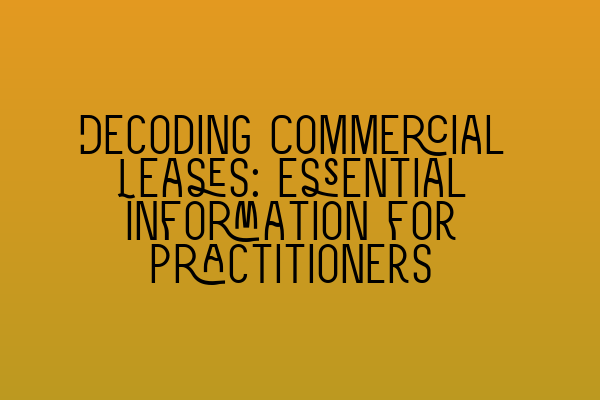Decoding Commercial Leases: Essential Information for Practitioners
Commercial leases are an integral part of the property law landscape, and as a practitioner, it is crucial to have a thorough understanding of this complex area. Whether you are a solicitor specializing in property law or a legal professional dealing with commercial leases, this article aims to provide you with essential information that will help you decode and navigate the intricacies of commercial leases.
1. What is a Commercial Lease?
A commercial lease is a legally binding agreement between a landlord and a tenant for the rental of a commercial property. Unlike residential leases, commercial leases are subject to different legislation and are often more complex in nature.
For a comprehensive overview of SQE Property & Land Law, take a look at our related article: SQE 1 Practice Exam Questions.
2. Key Terms and Provisions
Commercial leases typically include several key terms and provisions that are crucial to the rights and responsibilities of both the landlord and the tenant. These include:
- Rent: The amount of money the tenant pays to the landlord in exchange for the use of the property.
- Term: The duration of the lease, including the start date and end date.
- Break Clause: A provision that allows either party to terminate the lease before the end of the term.
- Repair and Maintenance: The obligations of the tenant and the landlord in terms of maintaining and repairing the property.
- Use Clause: The permitted uses of the property specified in the lease.
- Alienation: The ability of the tenant to assign or sublet the property, subject to the landlord’s consent.
- Security Deposit: A sum of money paid by the tenant as security for any potential damages or breaches of the lease obligations.
To test your understanding of commercial lease key terms and provisions, check out our related article: SQE 1 Practice Mocks FLK1 FLK2.
3. Lease Obligations and Covenants
A commercial lease includes various obligations and covenants that both the landlord and the tenant must adhere to throughout the term of the lease. These may include:
- Rent Payment: The tenant’s obligation to pay rent on time and in the agreed-upon amount.
- Repair and Maintenance: The tenant’s responsibility to keep the property in good repair and to conduct necessary maintenance.
- Compliance with Laws: Both parties are usually required to comply with all relevant laws and regulations.
- Non-Disturbance: The landlord’s covenant not to interfere with the tenant’s quiet enjoyment of the property.
For a deep dive into lease obligations and covenants, our related article on SQE 2 Preparation Courses will provide you with valuable insights.
4. Rent Review
Rent review is an essential aspect of a commercial lease. It allows the landlord to increase the rent periodically, ensuring that it reflects the current market value of the property. Rent review clauses can be complex, and as a practitioner, it is crucial to have a firm grasp of the different types of rent review mechanisms.
To equip yourself with the necessary knowledge about rent review and its intricacies, check out our related article on SQE 1 Preparation Courses.
5. Lease Renewal and Termination
When a commercial lease comes to an end, the tenant may have the right to renew or extend the lease. The Landlord and Tenant Act 1954 (Part II) provides statutory protection to tenants, giving them security of tenure. However, there are specific grounds on which a landlord can refuse to renew the lease.
To gain a comprehensive understanding of lease renewal and termination, explore our related article on SRA SQE Exam Dates.
Conclusion
Decoding commercial leases is essential for practitioners in property law to effectively navigate the intricacies of this complex area. By understanding the key terms, provisions, obligations, and covenants, as well as rent review mechanisms and lease renewal procedures, practitioners can provide expert advice and ensure the protection of their clients’ interests.
To enhance your knowledge and skills in property law and land law, check out our comprehensive range of SQE 2 Preparation Courses and SQE 1 Preparation Courses.
